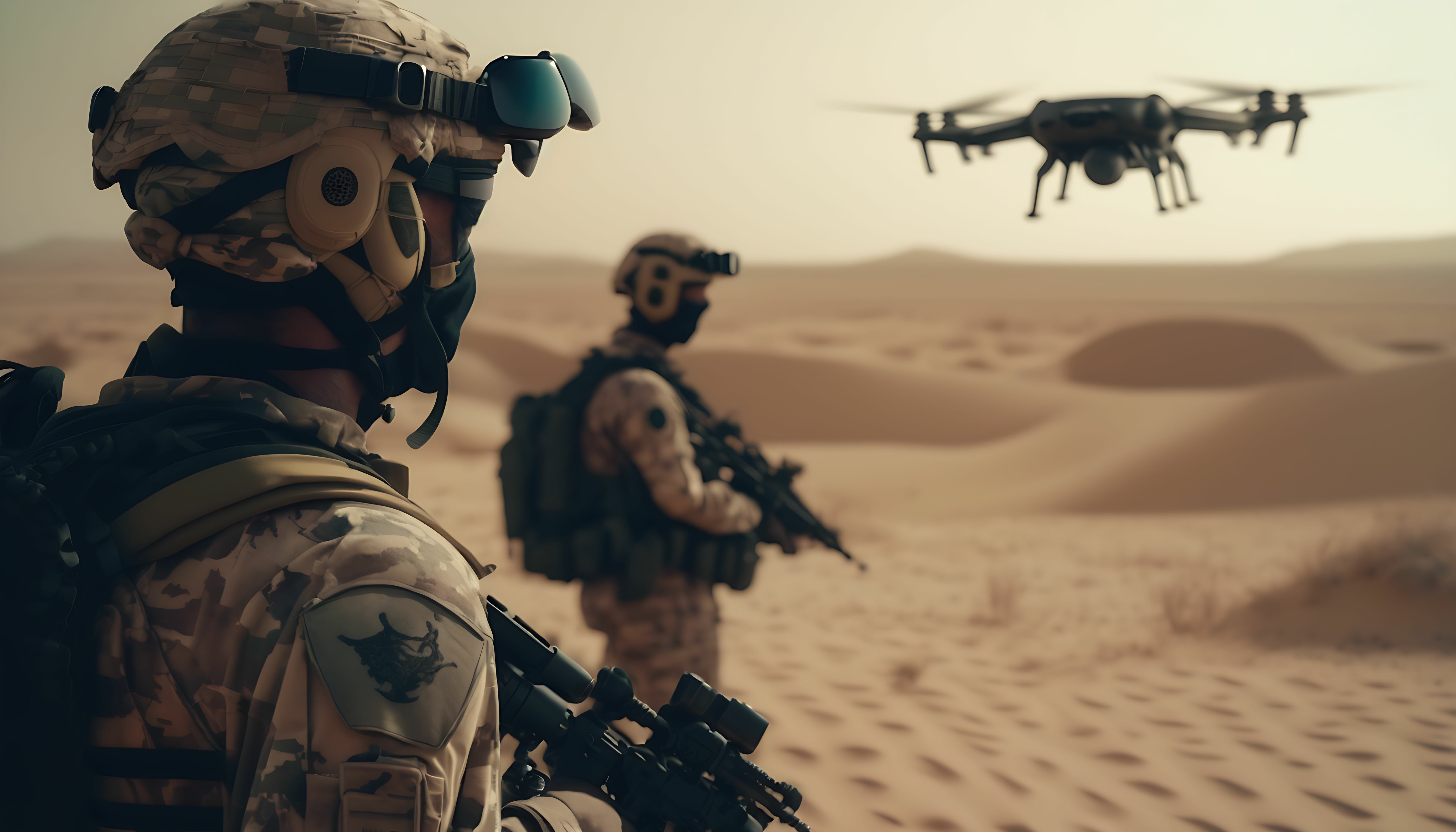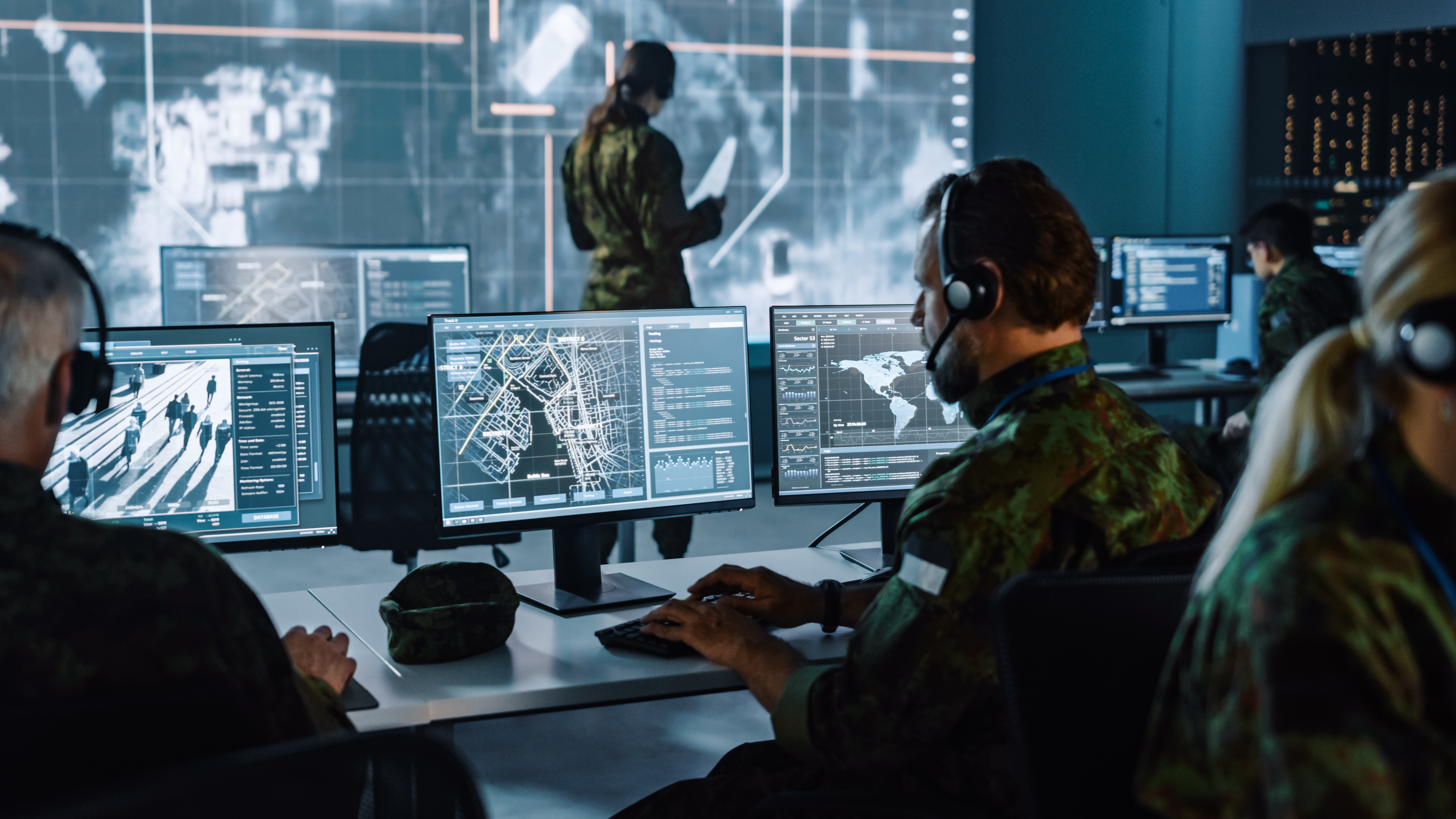AI at War: The Next Revolution for Military and Defense
August 4, 2023Artificial Intelligence has emerged as a game-changing technology with significant potential to enhance nearly all aspects of modern life. Much of the initial focus has been its potential impact on private sector industries like law, programming, and journalism. But perhaps its most significant impacts will be found in war and defense. The geopolitical landscape will likely shift dramatically depending on which nations harness the full power of AI and how they use it. Beyond the traditional battlefield applications, AI offers a multitude of ways to bolster defense capabilities, improve decision-making processes, and streamline operations.
With no intention of fully replacing the need for human soldiers, AI’s presence can act as a force multiplier, supplementing the strength of available personnel and potentially decreasing the dependence on recruiting.
Here are a few ways the U.S. military plans to use or already using AI in non-combat and combat applications.
Autonomous Systems and Robotics
The U.S. military is investing heavily in the research and deployment of AI-driven vehicles, drones, and robots, and it’s already promising to be one of AI’s most significant areas for impact. These autonomous platforms can perform various tasks, such as surveillance, reconnaissance, and logistics operations, reducing the risk to human lives and enabling the military to reach otherwise inaccessible areas. Further, by automating routine tasks, AI-equipped systems free up human personnel to focus on more strategic and critical missions.
Enhanced Data Analysis and Predictive Modeling
AI plays a critical role in processing and analyzing the massive amounts of data generated in modern warfare, which could otherwise overwhelm intelligence analysts. Advanced algorithms can sift through intelligence reports, satellite imagery, and other sources to identify patterns, trends, and potential threats. By providing actionable insights in real-time, AI empowers military leaders to make informed decisions that could be crucial for defense preparedness. Additionally, predictive modeling based on historical data can help anticipate potential threats and plan preemptive measures.
Cybersecurity and Network Defense
Facing an ever-evolving cyber threat landscape and with the government’s efforts focused on its new National Cybersecurity Strategy, AI offers the U.S. military a robust solution to enhance cybersecurity measures by continuously monitoring and analyzing network traffic. AI-driven cybersecurity systems can identify unusual patterns, detect potential cyberattacks, and respond promptly to block or mitigate the impact of threats. AI's adaptive nature also allows it to learn from past attacks, strengthening cyber defenses over time and bolstering the resilience of military networks from malicious actors.
Command and Control Systems
In the complex and constantly changing environment of defense operations, having an efficient command and control system is imperative. AI helps optimize military command centers by providing real-time data analysis, situational awareness, and decision support for commanders. With AI at their disposal, military leaders can better understand the battlefield situation, respond swiftly to emerging threats, and coordinate forces more effectively. By streamlining communication and enabling faster response times, AI can enhance the overall effectiveness of military operations.
Support of Combat Operations
While the use of lethal autonomous weapons is a contentious topic, the military is exploring their potential in warfare, in part, as a means of limiting the impact of combat on human lives. Autonomous weapons controlled by AI – like drone swarms, which can both act independently and share information with a group of drones to achieve overarching missions – are likely to become more common on the battlefield. However, there are significant ethical and legal concerns surrounding the deployment of fully autonomous weapons, and human oversight remains crucial to prevent unintended consequences.
Similarly, AI will play a critical role in supporting soldiers and commanders during live combat. AI's capabilities in image and video analysis have revolutionized target identification on the battlefield, and surveillance systems, drones, and satellites generate enormous amounts of imagery and video data. AI algorithms can analyze this data swiftly and accurately, enabling the identification of potential targets, threats, or suspicious activities. This capability enhances the military's ability to maintain situational awareness and make timely decisions based on real-time visual data.
The Future of Warfare and Defense
AI's integration into U.S. military defense operations has ushered in a new era of strategic advantage and operational efficiency. From autonomous systems and advanced data analysis to bolstering cybersecurity and enhancing combat capabilities, AI offers a variety of potential benefits that can significantly improve defense preparedness. However, as AI technologies continue to evolve, it is essential to approach their implementation responsibly by considering the ethical implications of their use and finding balance between AI capabilities and human involvement.
Capitol Technology University has a variety of degree programs in AI and other related-topics that can position you to support our national defense and warfare capabilities. For more information, visit the Capitol website or contact our Admissions team at admissions@captechu.edu.




